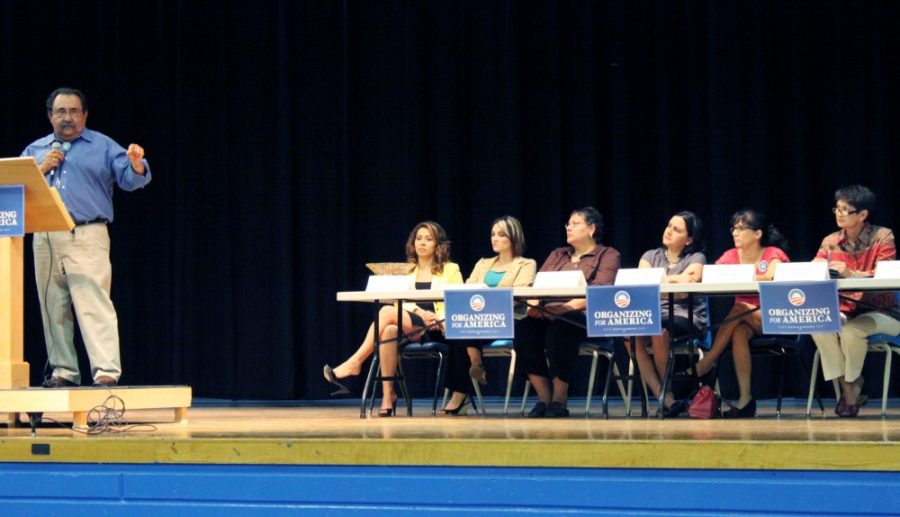The first bilingual town hall meeting about health care reform had no raucous dissenters, but there were enough tears to move the audience into heart-felt cheering.
Congressman Raul Grijalva was the main speaker at Saturday’s town hall meeting at Sunnyside High School in south Tucson. Grijalva presides over District 7, the district that includes the UA campus. A panel of health care providers and experts also spoke. The meeting was moderated by reporters Mary Rabago and Karla Gómez-Escamilla of Univision.
The meeting, conducted in Spanish, was intended for a Hispanic population who otherwise may not hear the reform options being put forward in Congress. Translator earpieces were available for those who needed them.
Grijalva spoke last of the panel. In his fourth term of Congress and with over 30 years of Arizona politics experience, Grijalva has vowed to vote only for a health care reform plan that includes a public option.
Public investment is a necessary component of a successful health care plan, he said.
“”When we as a nation spoke of the government bailing out the banks, or when we spoke of bailing out the auto industry, that wasn’t socialism,”” he said. “”But now when we speak of investing in a bright future for our children, that’s socialism. Right now, we are fighting political philosophies rather than fighting the reality we are facing.””
Organizing for America, the group that hosted the meeting is part of the Democratic National Committee and is currently focused on grassroots activism for health care reform, Jessica Jones the Arizona director for the organization said. The group’s goal, she said, is to “”bring political agendas to people face-to-face on their porches, at their dinner tables, and in their communities.””
Jones added that holding the forum in Spanish was important because “”this legislation is going to affect everyone, no matter their language.””
Chris Parent, a political science junior, is an intern this semester for Organizing for America, working particularly for the health care reform public option. The public option, he says, is designed to provide for the people who are shut-down by insurance companies for pre-existing illnesses. An important part of the health care reform plans that Congressman Grijalva is supporting is the upgrade of technology in hospitals, Parent said. This upgrade will greatly reduce cost and prevent errors in service.
One panelist was Josefina Ilturrade, a surviving breast and liver cancer patient who has been having trouble with her health insurance. She cried as she spoke of how difficult it is to provide for her children while battling both to stay alive and to pay the bills. Her ardent pleas for support of Grijalva’s efforts to implement a public option were met with loud clapping and cheering.
Medical professionals were on hand to validate Ilturrade’s and others’ distress.
College of Pharmacy clinical instructor and doctor of pharmacy Sandra Leal said that people now “”have to make the choice between paying their bills and paying for their medications.”” This should not be a choice they have to make, she said. “”If children can choose what schools they go to, they should be able to choose what doctor they go to. It’s a human rights issue.””
Other speakers focused on the challenges of providing health care to the local Hispanic community.
Cecilia Rosales, Ph.D., an associate professor of Community, Environment, and Policy, said there is a higher number of people in border states — where more than half the Hispanic population of the United States lives — without insurance than elsewhere.
The “”socio-economic statuses of these populations put them in a vulnerable state of health,”” she said.
Rosales described the situation as an inevitable cycle where populations tend to not get treatment for tuberculosis, diabetes, heart disease or depression because “”they lack the resources, and it ends up making them pay more because they didn’t take care of it in the beginning.””
One Hispanic man stood to ask a question about how the health care reform will help provide for those who lose their job. He said was not permitted to receive Arizona Health Care Cost Containment System because he was unemployed, making it difficult for him to feed his family as he looked for a new job. His tearful story again brought people to their feet.
Chemical engineering junior Ramsey Coronado was among those with an emotional reaction to the stories.
“”That hit me,”” he said. “”It was like, ‘He’s my people…I know where he’s coming from, the context.’ I have my family that I’m taking care of and that inability to provide health care is so hard.”” Coronado came with a group of several students from the UA’s St. Thomas More Catholic Newman Center at the University of Arizona. Coronado added, “”It’s very rare to see a Hispanic man break down like that. We’re cultured to show no tears, like it’s weakness. That’s what makes it so touching. I know how he feels.””
Physiology and religious studies junior Krista Bolin, also with the Catholic Newman Center, said that many students take their health care accessibility for granted. For this reason, she said, it’s great to be part of a student contingent at a meeting like this.
“”I am pre-med,”” she said, “”so I need to be informed about what will affect my future and the future of those I’m helping.””









